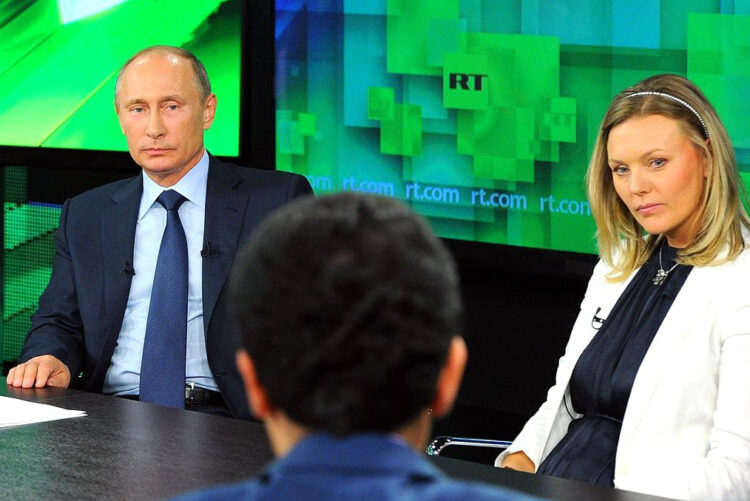Russia went to war with us long ago and media is the frontline

Editor’s comment
Long before Putin invaded Ukraine, our media was invaded by Russian disinformation and cyber warfare. Our government and media companies must take greater action.
Vladimir Putin may have ordered an invasion of Ukraine four days ago, but war with Russia has been going on for years now. Media has been at the frontline of this slowly intensifying battle with state-sponsored Russian propaganda and disinformation.
Our journalists are under siege by wealthy Russian oligarchs who use the UK’s strong defamation laws to muzzle scrutiny over money laundering and ties to the Kremlin. Last month MPs warned that wealthy clients and oligarchs from autocratic countries are using prestigious London law firms to intimidate and silence journalists, using so-called Slapps (strategic lawsuits) to legally harass critics and watchdogs.
That debate came weeks after News Corp’s HarperCollins settled with Chelsea owner Roman Abramovich over claims the Kremlin encouraged the football club purchase. This weekend The Observer’s Nick Cohen revealed the publisher had to shell out £1.5m after a lengthy ordeal at The High Court.
Remember that these Russian oligarchs are, at best, friends of the Putin regime. At worst, they are patronising stooges. If you’re expecting Abramovich, or the Lebedev owners of ESI Media, to say anything critical of Putin’s invasion of Ukraine, you may face a very long wait.
Meanwhile, our social media companies are under constant attack from fake accounts and bots that promote pro-Russian propaganda. As the journalist Carole Cadwalladr reminded us in an excellent Twitter thread last night, we have failed to learn the real lessons of the big domestic political bombshells in recent years.
Ok. Deep breath.
I think we may look back on this as the first Great Information War. Except we’re already 8 years in.
The first Great Information War began in 2014. The invasion of Ukraine is the latest front. And the idea it doesn’t already involve us is fiction, a lie.
1/— Carole Cadwalladr (@carolecadwalla) February 27, 2022
The Brexit vote, the improbable 2016 election of Donald Trump, the Mueller report into Trump’s alleged “collusion” with Russia – they are all filled with examples of how a systematic campaign of aggression by Russia is bent on weakening Western democracies by amplifying our divisions and insecurities.
Meanwhile in TV land, much of the debate last week in response to the Ukraine invasion has centred around whether RT, the Russian state-owned TV station, should continue to broadcast in the UK with an Ofcom licence. Boris Johnson revealed at Prime Minister’s Questions last Wednesday that the government had already asked Ofcom to look at the matter.
Some commentators have made the point that it’s not worth banning RT, despite being widely known as a Russia propaganda network that, for some reason, seems to think disgraced former MPs are ideal chat show hosts. Tech journalist James Ball wrote in The New Statesman that the channel is irrelevant and would just serve to give Putin an excuse to ban the BBC in Russia, which would be a much more negative blow to independent journalism.
Meanwhile the senior Conservative MP Tom Tugendhat argued in The Mail on Sunday that RT is “nothing but poison” and should already have been banned by Ofcom. Yesterday the European Union announced it would ban RT across the continent, as well as “developing tools to ban their toxic and harmful disinformation in Europe”.
This view is not shared by Johnson, who barked at PMQs last Wednesday: “We live in a country that believes in free speech. I think it’s important that we should leave it up to Ofcom rather than to politicians to decide which media organisation to ban – that’s what Russia does.”
No one needs reminding that, when he’s not busy making a mockery of lockdown rules by hosting boozy parties at his Downing Street home office, Johnson has spent his premiership abusing his free speech privileges more than any British leader in the modern age.
The man who still won’t apologise for spreading lies last month about the Labour leader’s Keir Starmer refusing to prosecute Jimmy Savile, is the same person who led his party to victory after setting up a fake “fact-checking” service during the 2019 general election campaign.
Johnson has not invaded a European neighbour like Putin, but he displays the same tendency to lie and spread disinformation, which makes him an unreliable ally in this wider information war.
The fundamental weakness that Johnson, like Putin and his disinformation army, continue to exploit is that we are struggling to combat fraud and deception as we protect free speech in our media spaces.
Free speech is a precious and fundamental part of individual liberty; but free speech can be suffocated when driven into a morass of fake news, gaslighting and astroturfing.
A marketplace of ideas needs to be regulated like any market – dodgy goods and the dodgy people that sell them shouldn’t be allowed to trade. But how to police free speech without a slide into authoritarianism and surveillance? This is the apparently insoluble problem of the digital media age.
For too long our governments have failed to have the imagination or resolve to force digital media companies to take more action over fake accounts. And we, the public and the media industry, have failed to demand strongly enough that our governments do better.
I hope this abhorrent war against the Ukrainian people can end quickly. But the information war will last for decades to come unless our media companies and our governments summon the guts, weapons and tactics to fight back.
omar.oakes@mediatel.co.uk
@OmarOakes
@TheMediaLeader (previously Mediatel News)
(Main image: Vladimir Putin visits RT in Moscow; courtesy of www.kremlin.ru)
100% Media 0% Nonsense – don’t miss the editor’s weekly column and the latest stories from The Media Leader in our new Monday newsletter. Sign up here.
PLUS: Why we’ve rebranded from Mediatel News to The Media Leader



